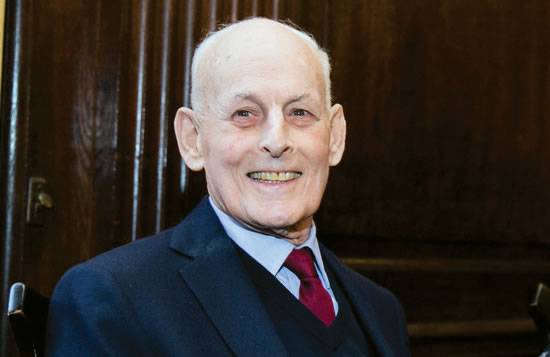GUEST EDITORIAL
Lincoln, Abolition, & Economic Freedom
By Lewis E. Lehrman

Lewis E. Lehrman
To read carefully Lincoln’s parable of the ant suggests a lost truth: During most of his political career, Lincoln focused not on anti-slavery but on economic policy. Yet anti-slavery and economic policy, in his worldview, were tightly linked. In commercial terms, slavery is theft: “The ant, who has toiled and dragged a crumb to his nest, will furiously defend the fruit of his labor, against whatever robber assails him. … The most dumb and stupid slave, that ever toiled for a master, does constantly know that he is wronged.” It is a truth, he asserted, “made so plain by our good Father in Heaven, that all feel and understand it.”
On his way to Washington in early 1861, the president declared, “I have never had a feeling politically that did not spring from the sentiments embodied in the Declaration of Independence.” Earlier, he had written, “Most governments have been based, practically, on the denial of the equal rights of men. Ours began, by affirming those rights.” At Gettysburg, he insisted that America — despite the flaw of slavery, accepted in order to establish the Constitution — had been “dedicated to the proposition that all men are created equal.”
Bound together neither by race nor blood, Americans inherit a single patrimony: equality under the law and equality of opportunity. Lincoln’s equality was the latter: “I think the authors of that notable instrument [the Declaration of Independence] intended to include all men, but they did not intend to declare all men equal in all respects. They did not mean to say all were equal in color, size, intellect, moral developments, or social capacity. They defined … in what respects they did consider all men created equal — equal in ‘certain inalienable rights, among which are life, liberty and the pursuit of happiness.’”
Government, Lincoln believed, should enable men and women to develop their freedom, their future, and their country. Lincoln urged that government should be pro-labor and pro-business. His economic philosophy rejected the idea of necessary conflict between labor and capital. In fact, Lincoln argued that capital was, itself, the result of the savings of free labor. Thus, it follows that people are the most important resource, not wealth.
Lincoln defined the essence of the American dream: “There is not, of necessity any such thing as the free hired laborer being fixed to that condition for life. … The prudent, penniless beginner in the world, labors for wages awhile, saves a surplus with which to buy tools or land for himself; then labors on his own account another while, and at length hires another new beginner to help him. This is the just, and generous, and prosperous system, which opens the way to all — gives … energy, and progress, and improvement of condition to all.” More than one hundred years later, Martin Luther King Jr. called for the economic rights that would take African-Americans one step closer to freedom: the Negro’s “unpaid labor made cotton king and established America as a significant nation in international commerce. Even after his release from chattel slavery, the nation grew over him, submerging him. … And so we still have a long, long way to go before we reach the promised land of freedom.”
Born poor, Lincoln was probably the greatest of self-made men, believing, as he said, that “work, work, work, is the main thing.” Lincoln’s America was, in principle, a colorblind America. The great abolitionist Frederick Douglass saw this clearly, calling Lincoln “the first great man that I talked with in the United States freely, who in no single instance reminded me … of the difference of color.” He attributed Lincoln’s attitude to the fact that he and Lincoln were self-made men — “both starting at the lowest rung of the ladder.”
Surely we know about Lincoln’s humble parents, his lack of formal education, his discreet but towering ambition. No descendants carried on his legacy of national leadership. Like a luminous comet, he had for a twinkling thrust himself before our eyes, the eyes of the world, there to dissolve into the vast deep whence he came. #
Lewis E. Lehrman is co-founder of the Gilder Lehrman Institute of American History and author of Lincoln at Peoria: The Turning Point (Stackpole Books, 2008). The above is an abridged version of a 2004 essay by Lewis Lehrman titled “‘To give all a chance’: Lincoln, Abolition and Economic Freedom,” published by the Gilder Lehrman Institute of American History.
Reprinted from the January/February 2010 issue of Education Update.
